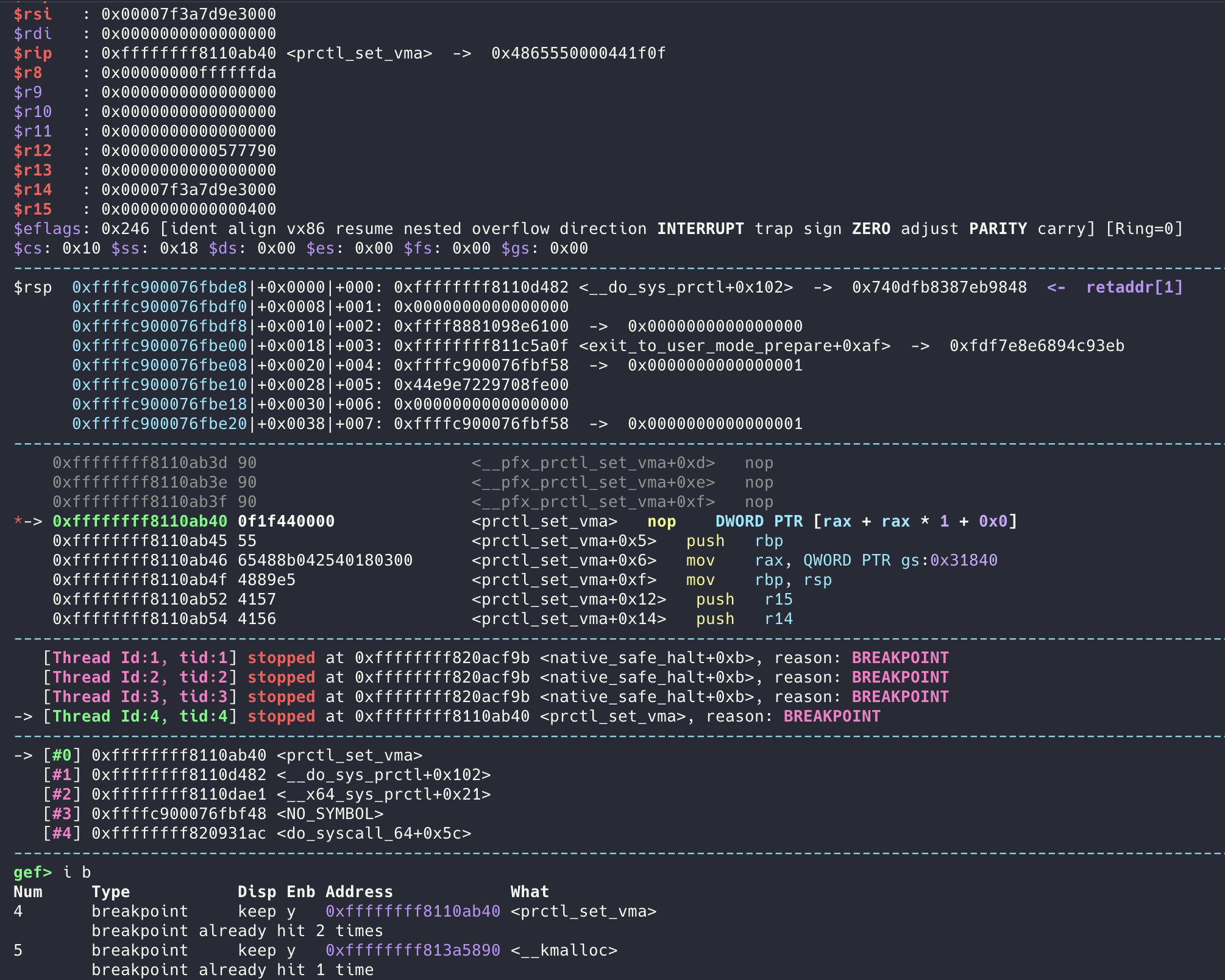[KPWN] A Relatively New Kernel Elastic Object Structure: anon_vma_name
A quick note: this can be used as a heap-spray object. You can spray sizes in the range [kmalloc-8, kmalloc-96], with each system call allocating exactly one object under the GFP_KERNEL flag. The name is readable (though truncated at \0), and you can free it.
I saw this in a paper, but after checking around I found no one in China has written about this struct. Its small size makes it quite useful. You could also use msg (message queues), but those live in cgroup groups and to heap spray you’d need cross-cache techniques, which is cumbersome.
You can see between two syscalls there is only one __kmalloc invocation:

Code Skeleton
#define _GNU_SOURCE
#include <sched.h>
#include <stdio.h>
#include <unistd.h>
#include <fcntl.h>
#include <stdlib.h>
#include <string.h>
#include <sys/ioctl.h>
#include <sys/stat.h>
#include <sys/mman.h>
#include <sys/ipc.h>
#include <sys/msg.h>
#include <sys/wait.h>
#include <sys/syscall.h>
#include <sys/socket.h>
#include <sys/prctl.h>
#define PAGE_SIZE (1 << 12)
#define ALLOCS 2048*4
static size_t times[ALLOCS];
static void *addresses[2*ALLOCS];
#ifndef PR_SET_VMA
#define PR_SET_VMA 0x53564d41
#define PR_SET_VMA_ANON_NAME 0
#endif
int rename_vma(unsigned long addr, unsigned long size, char *name)
{
int res;
res = prctl(PR_SET_VMA, PR_SET_VMA_ANON_NAME, addr, size, name);
if (res < 0)
printf("prctl");
return res;
}
void init_vma_name(void)
{
printf("init addresses\n");
for (int i = 0; i < 2*ALLOCS; i++) {
addresses[i] = mmap(0, 1024, PROT_READ | PROT_WRITE,
MAP_PRIVATE | MAP_ANONYMOUS, -1, 0);
if (addresses[i] == MAP_FAILED)
printf("mmap");
}
}
void alloc_objs(size_t size)
{
// size from 0 to 80
printf("allocate %d objs\n", ALLOCS);
char *buffer;
buffer = malloc(size);
memset(buffer, 0x41, size);
buffer[size - 1] = 0;
for (size_t i = 0; i < ALLOCS; i++) {
char store[5];
memset(store, 0, 5);
snprintf(store, 5, "%04ld", i);
memcpy(buffer, store, 4);
printf("buffer %s len %ld\n", buffer, strlen(buffer));
rename_vma((unsigned long)addresses[i], 1024, buffer);
}
}
// To free:
// rename_vma((unsigned long)addresses[i], 1024, NULL);
// To read names:
// cat /proc/self/maps
Analysis
prctl Wrapper
The prctl syscall is defined as:
SYSCALL_DEFINE5(prctl, int, option,
unsigned long, arg2,
unsigned long, arg3,
unsigned long, arg4,
unsigned long, arg5)
For the PR_SET_VMA option, it calls:
case PR_SET_VMA:
error = prctl_set_vma(arg2, arg3, arg4, arg5);
break;
So the user API is:
int prctl(int PR_SET_VMA,
unsigned long opt,
unsigned long addr,
unsigned long size,
const char *name);
prctl_set_vma Implementation
In kernel/sys.c:
#ifdef CONFIG_ANON_VMA_NAME
#define ANON_VMA_NAME_MAX_LEN 80
#define ANON_VMA_NAME_INVALID_CHARS "\\`$[]"
static int prctl_set_vma(unsigned long opt,
unsigned long addr,
unsigned long size,
unsigned long arg)
{
struct mm_struct *mm = current->mm;
const char __user *uname;
struct anon_vma_name *anon_name = NULL;
int error;
switch (opt) {
case PR_SET_VMA_ANON_NAME:
uname = (const char __user *)arg;
if (uname) {
char *name, *pch;
name = strndup_user(uname, ANON_VMA_NAME_MAX_LEN);
if (IS_ERR(name))
return PTR_ERR(name);
for (pch = name; *pch != '\0'; pch++) {
if (!is_valid_name_char(*pch)) {
kfree(name);
return -EINVAL;
}
}
anon_name = anon_vma_name_alloc(name);
kfree(name);
if (!anon_name)
return -ENOMEM;
}
mmap_write_lock(mm);
error = madvise_set_anon_name(mm, addr, size, anon_name);
mmap_write_unlock(mm);
anon_vma_name_put(anon_name);
break;
default:
error = -EINVAL;
}
return error;
}
#endif
Checks are minimal: ensure the name is printable, contains no invalid chars, and length (including terminator) ≤ 80.
anon_vma_name_alloc
In mm/madvise.c:
struct anon_vma_name *anon_vma_name_alloc(const char *name)
{
struct anon_vma_name *anon_name;
size_t count;
count = strlen(name) + 1; // include NUL
anon_name = kmalloc(struct_size(anon_name, name, count), GFP_KERNEL);
if (anon_name) {
kref_init(&anon_name->kref);
memcpy(anon_name->name, name, count);
}
return anon_name;
}
It allocates strlen(name)+1 + sizeof(kref) bytes with GFP_KERNEL.
Note: if you reuse the same name, refcount increments instead of allocating a new struct (see dup_anon_vma_name). To free, set the name to NULL and let the refcount go to zero.
Reading the Names
When you read /proc/self/maps, the kernel calls:
static void show_map_vma(struct seq_file *m, struct vm_area_struct *vma)
{
struct anon_vma_name *anon_name = NULL;
...
if (mm)
anon_name = anon_vma_name(vma);
if (file) {
if (anon_name)
seq_printf(m, "[anon_shmem:%s]", anon_name->name);
else
seq_file_path(m, file, "\n");
goto done;
}
...
}
This outputs [anon_shmem:<name>], which you can parse to retrieve your sprayed names.
This Content is generated by LLM and might be wrong / incomplete, refer to Chinese version if you find something wrong.